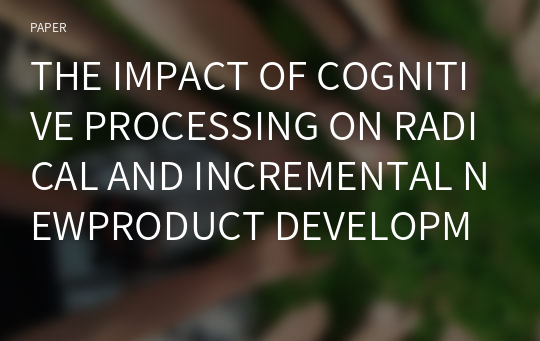THE IMPACT OF COGNITIVE PROCESSING ON RADICAL AND INCREMENTAL NEWPRODUCT DEVELOPMENT PERFORMANCE
* 본 문서는 배포용으로 복사 및 편집이 불가합니다.
서지정보
ㆍ발행기관 : 글로벌지식마케팅경영학회(GFMC)
ㆍ수록지정보 : Global Marketing Conference
ㆍ저자명 : Tetsuo Horiguchi
ㆍ저자명 : Tetsuo Horiguchi
영어 초록
Introduction Since most companies are constantly confronted with incremental technology obsolescence and the risk of disruptive innovations, they have been struggling to pursue both incremental and radical new product developments (NPD). Due to these practical concerns, scholars have conducted research to reveal which factors promote “ambidexterity (O’Reilly & Tushman, 2008)” of both explorative activities, including radical NPD, and exploitative activities, including incremental NPD, mainly focusing on organizational structures and systems. For example, previous studies have suggested organizational structures (Gibson & Birkinshaw, 2004), cross-functional integration (Brettel, Heinemann, Engelen and Neubauer, 2011), and management systems (Benner & Tushman, 2003) are the factors to promote ambidexterity. Furthermore, recent studies have emerged suggesting the importance of cognition in pursuing both radical and incremental NPD (Smith & Tushman, 2005; Eling, Griffin, & Langerak, 2014). Although the importance of cognitive processes in NPD has been suggested in some studies, the research exploring these roles is scarce. Therefore, this study attempts to fill in the gaps by revealing the roles of cognitive processes (analytical processing, intuitive processing, and associative processing) on radical and incremental NPD performance empirically. Theoretical Background and Literature Review The purpose of this section is to attempt to reveal the points not addressed adequately in extant literature. In order to do so, firstly, this section tries to classify the cognitive processing in previous studies, according to some criteria. Secondly, the section reviews the empirical research regarding the effects of cognitive processing on decision-making. Lastly, it goes on to compare the reviewed empirical studies with the classification of cognitive processing that are indicated and attempts to review the gaps in previous research. The research on cognitive processing Referring to the rule-based processing and the associative processing, proposed in Smith & Decoster (2000), as well as the logico-deductive manner of rational choice and the associative thinking, proposed in Gavetti (2005, 2012), this study proposes three types of cognitive processing: analytical, intuitive, and associative processing.Analytical processing involves a comprehensive consideration of various factors, such as market environments, competitors’ behaviors and strategic alternatives, to make a judgement. One example of analytical processing is that we use a 3C framework to make a judgement regarding a new product concept. Intuitive processing involves making a judgement based on intuition, or judging without deliberation. One example of intuitive processing is adopting the product design that arouses feeling of rightness of choice (Dijksterhuis & Nordgren, 2006) or excitement (Agor, 1986) without clear bases. Associative processing involves consciously searching for a past experience or knowledge which is similar to a current situation, and making a judgement based on it. One example of this is when we intentionally recall a past experience in NPD, or a case in another industry that is similar to the current NPD situation, and determine the strategy by following it. The empirical research on the effect of cognitive processing There is an accumulation of empirical research on the effect of cognitive processing on decision making performance, management, and marketing literature. Dean and Sharfman (1996) empirically considered the relationship between the procedural rationality, defined as “the extent to which the decision process involves the collection of information relevant to the decision and the reliance upon analysis of this information in making the choice” (p. 373) and strategic decision effectiveness. Menon, Bharadwaj, Adidam and Edison (1999) empirically examines the relationship between situation analysis, referring to “rational and systematic consideration of the organizational SWOTs in a marketing strategy domains” (p. 21), and market performance, strategy creativity, and organizational learning. Yamashita, Fukudome, Uehara, and Sasaki (2012) studies the relationship between marketing strategy, referring to the extent that the marketer uses STP framework in the phase of decision making, and business unit’s performance. The constructs, such as procedural rationality, situational analysis, and marketing strategy, seem to approximately correspond to the analytical processing indicated in the previous section. Although previous research reviewed so far only focuses on analytical processing, there is research considering other cognitive processing. De Visser et al. (2014) examines the effects of NPD team’s intuitive information processing and analytical information processing on incremental and radical NPD’s overall performance. This study suggests that analytical processing affects overall NPD performance positively while intuitive processing affects only radical NPD performance in a positive manner. Table 1 indicates the arrangement of the reviewed empirical studies. The gaps in the literature From the previous research review, this study indicates three points not addressed adequately in the literature. First, as shown in Table 1, there is little research focusing on cognitive processing aside from analytical processing (especially on associative processing). Second, the research considering the relationship between cognitive processing and radical/ incremental NPD performance is scarce (except for de Visser etal (2014)). Third, little research has considered the effects of the cognitive processing of a new product development (NPD) leader, on the NPD performance. Given these points, this study focuses on the cognitive process of a NPD leader and considers the effects of analytical processing, intuitive processing, and associative processing, on incremental/ radical NPD project performance. Table 1 Research Hypotheses Generally, the uncertainty of incremental NPD projects is low. In such situations, it is relatively easy for NPD leaders to collect and analyze various data for judgements (analytical processing), enabling them to estimate and predict the surrounding situation more accurately. Thus, analytical processing affects the incremental NPD project positively. Using intuitive processing, a NPD leader makes judgements, automatically referring to past repeated experiences (cf. Smith & DeCoster, 2000). These judgements are correct in most cases, but judgement errors are sometimes brought about, due to inaccurate application of repeated experiences to a judgement. Furthermore, due to its automatic and preconscious nature, the bases of the judgement guided by intuitive processing cannot be explained clearly (Smith & DeCoster, 2000; Eling et al., 2014), which seems to increase the frequency of conflicts. Taking these effects in consideration, this study predicts that intuitive processing does not affect incremental NPD project performance. Using associative processing, a NPD leader replaces an uncertain situation with a past experience or knowledge that is more familiar to them, in order to make a judgement. However, such replacement is not effective in incremental NPD projects because, in general, they tend to be less uncertain. Thus, it is predicted that associative processing does not affect incremental NPD project performance. H1a: As a NPD leader uses the analytical processing more frequently in an incremental NPD project, the NPD project performance will be higher. H1b: The frequency of using intuitive processing by a NPD leader does not affect the incremental NPD project performance. H1c: The frequency of using associative processing by a NPD leader does not affect the incremental NPD project performance. Generally, as the needs of radical NPD deviates from organizations’ existing routines (Smith & Tushman, 2005), its uncertainty increases. In these situations, analytical processing is not appropriate for judgements due to the factors such as a lack of information and defined criteria (March, 2006). Part of the previous research suggests the positive effect of intuitive processing on radical NPD performance due to its tendency to generate creative ideas (de Visser et al., 2014). Given this, it is predicted that intuitive processing by a NPD leader positively affects the radical NPD performance. In contrast, it is also said that intuitive processing is likely tocause error of judgement in novel situations or strategies (cf. Miller & Ireland, 2005), and conflicts. Considering these, this study does not posit that any directional relationship between intuitive processing and radical NPD project performance. Associative processing can cope with uncertain situations by relating and drawing similarities from a previous familiar experience to the current uncertain situation (Gavetti, 2012). In addition, since associative processing is a conscious mental activity, its risk of error of judgement is lower than that of intuitive processing (cf. Stanovich & West, 2000). Considering this, it is predicted that there will be a positive effect of associative processing on radical NPD project performance. H2a: The frequency of using analytical processing by a NPD leader does not affect the radical NPD project performance. H2b: The frequency of using intuitive processing by a NPD leader affects the radical NPD project performance. H2c: As a NPD leader uses the associative processing more frequently in a radical NPD project; the NPD project performance will be higher. The depth of NPD leader’s experience refers to the extent that he has engaged in many NPD projects in one product category. The width of the NPD leader’s experience means the extent that he has engaged in NPD projects in various product categories. For want of space, the detailed explanation of H3 is skipped in this abstract. H3: The depth and width of the NPD leader’s experience moderate the relationship between cognitive processing and NPD project performance. Figure 1 METHODOLOGY This study uses the data collected from Japanese high-tech manufacturing companies, through survey research. The collected data will be used to empirically test the hypotheses. At the empirical test, the samples will be divided into two groups according to the NPD radicalness, and each group will be applied hierarchical multiple regression analysis to examine the relationship among the constructs. This study incorporates three independent variables, one dependent variable, three moderator variables and three control variables, into the model. The independent variables are analytical, intuitive, and associative processing. The dependent variable is overall NPD project performance. The moderator variables are NPD radicalness, depth and width of NPD leader’s experience. The control variables are firm size, devoted resource and the development period of a new product. The main variables of this model will be measured as follows. The scales of analytical processing and intuitive processing are developed, referring to those of Epstein et al. (1996) and de Visser et al. (2014). The scale of associative processing is developed for this study by drawing on the extant literature such as Gavetti(2005; 2012). Overall NPD project performance is measured by adopting the scale of Hoegl, Weinkauf, and Gemuenden (2004). The results of the analysis will be reported at the presentation in 2016 Global Marketing Conference in Hong Kong.참고 자료
없음태그
"Global Marketing Conference"의 다른 논문
 THE ROLES OF GREEN PACKAGING IN UGLY FOOD PURCHASE INTE..22페이지
THE ROLES OF GREEN PACKAGING IN UGLY FOOD PURCHASE INTE..22페이지 THE IMPACT OF INDUCED AWE ON ETHICAL TOURIST BEHAVIORS5페이지
THE IMPACT OF INDUCED AWE ON ETHICAL TOURIST BEHAVIORS5페이지 A BIBLIOMETRIC ANALYSIS OF SPIRITUAL TOURISM RESEARCH15페이지
A BIBLIOMETRIC ANALYSIS OF SPIRITUAL TOURISM RESEARCH15페이지 SOCIAL NETWORK ANALYSIS AND RESPONSE TIME TESTING: CONS..11페이지
SOCIAL NETWORK ANALYSIS AND RESPONSE TIME TESTING: CONS..11페이지 THE EFFECTS OF PARA-SOCIAL INTERACTION ON ONLINE CELEBR..3페이지
THE EFFECTS OF PARA-SOCIAL INTERACTION ON ONLINE CELEBR..3페이지 THE INFLUENCE OF OPINION LEADERS ON DAILY DEALS USER’S ..3페이지
THE INFLUENCE OF OPINION LEADERS ON DAILY DEALS USER’S ..3페이지 HOW IMMERSIVE RETAILING AFFECTS CONSUMERS’ URGE TO BUY:..6페이지
HOW IMMERSIVE RETAILING AFFECTS CONSUMERS’ URGE TO BUY:..6페이지 KEY TO SUPERSTARDOM IN A GLOBALISED MARKET: THE ROLE OF..6페이지
KEY TO SUPERSTARDOM IN A GLOBALISED MARKET: THE ROLE OF..6페이지 A POST-PANDEMIC LOOK AT TOURISTS’ PERCEIVED COOLNESS OF..4페이지
A POST-PANDEMIC LOOK AT TOURISTS’ PERCEIVED COOLNESS OF..4페이지 EXTRACTING OFFLINE RETAIL SHOPPING PATTERNS: OLLABORATI..5페이지
EXTRACTING OFFLINE RETAIL SHOPPING PATTERNS: OLLABORATI..5페이지


















